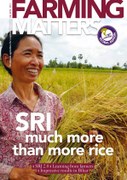Riverside forests
When we talk about desertification, we should not forget the riverside forests. These have abundant native vegetation and should be recognised as areas of ecological importance – not only for the supply of organic material to the system, but also for other functions such as providing an area of refuge for breeding birds. They provide shade on the headwaters of the rivers, helping to maintain water temperature. But surely they are most relevant for the protection offered to the aquatic system, by acting as natural traps for retaining sediments and preventing nutrients from the soil from being washed into water courses.
Saul Leyva Chinchay, Empresa
Azucarera Andahuasi, Peru
Farmer organisations
Thank you for dedicating a whole issue to farmer organisations! In the Netherlands there is an expression that says that organising farmers “is like trying to move a wheelbarrow full of living frogs”. It is in farmers’ nature to be independent and follow their own path, which makes it difficult for them to get organised. However, I like to see the positive side of diversity: with so many different passions and ideas, family farmers are more flexible, and this makes them well suited to farming in varying places and changing times. Strength in diversity is one way to unite family farmers: while highly specialised laboratory-like industrial farms perform well in single crop yields, family farmers are the absolutely winners when it comes to resilience, adaptability to markets and environments, and having a healthy diversity of farm products.
Klarien Klingen, co-ordinator
Boerengroep, the Netherlands
Development 3.0
I am writing about the article on “Development 3.0” in the latest issue of Farming Matters. Honestly, I was surprised to read three European or North American men with comfortable jobs writing about farmers’ realities. It seems like they do not recognise that much of what happens with farmers is also a consequence of positive government intervention – starting with roads, schools, electricity and other services that are highly valued in my region of Carchi, Ecuador. We should distinguish between a “theory of change”, one that can be defined by the authors of this article, and a theory for change. We talk about how change happens, but we are deceived into thinking that this is the way we can debate and promote change. Farming Matters needs to get others to talk about this in the magazine. There are enough of them around the world!
Irene Torres, Fundación Octaedro, Ecuador
Biodiversity on farms
If 10% of a farm’s land consists of hedges (windbreaks, trees and shrubs for harvesting berries, etc.,) and banks, this can increase biodiversity a lot, and provide many ecosystem services. This is because most of the biodiversity is found in the borders between forest and field, and between land and water. You don’t have to have a forest to have a forest edge; and you don’t have to have a lake to have a bank. Keeping animals as well as plants also increases biodiversity and good husbandry also increases farm resilience. I find that the more I learn about ecology and agriculture, the more obvious it becomes that biodiversity and farming are not opposites: as the Polyface farms in the US show, biodiversity makes farming more resilient, labour-extensive and productive.
Lucas Brouns, in response to the online debate on agriculture and biodiversity, www.agriculturesnetwork.org.
Land rights
From research carried out in some farming areas in Kitwe, it was discovered that people still lack information on land administration and boundary disputes in Zambia. As a result, many people have illegal settlements and go to the wrong people to acquire land. Even some civil society leaders do not know the procedure for acquiring land. This has caused a lot of disputes. One of the things we need to do is to continue educating small-scale farmers on land administration and other related issues. Empowering people by sharing knowledge on who the stakeholders in land administration are is a means of poverty reduction. This will require community meetings, radio programmes, etc. Land is the basis of many people’s livelihoods, so depriving them of this valuable resource is denying them life.
Mpenza Kapata Mwanza, Zambia
Farming Matters welcomes comments, ideas and suggestions from its readers. Please contact us via e-mail at ileia@ileia.org or write to P.O. Box 90, 6700 AB Wageningen, the Netherlands.

